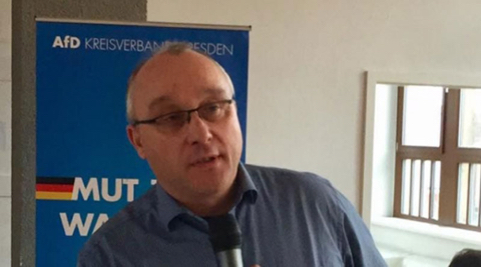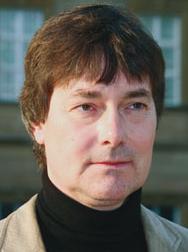
As part of the nationalist tide sweeping Europe,
the Alternative for Germany party is pushing to change
how the country views its Nazi past,
upending decades of consensus.
"Reject the crippling guilt which becomes
internalized as self-hatred and destroys a nation."
--Michael Hoffman
This was received from Michael Hoffman who writes: "Anton Troianovski's report (below) is something of a joke. He whitewashes the genocide committed against the Germans by transforming it into just "Dresden" and mistreatment of German prisoners of war. The incineration of 500,000 civilians in German cities, the mass rapes of nearly a million German women by Americans as well as Russians (cf. Revisionist History newsletter 88), and the deaths of millions of Germans ethnically cleansed from Eastern Europe at the end of the Second World War, are not mentioned.
Troianovski even has a German war veteran doubting not Auschwitz homicidal gas chambers, but the existence of Auschwitz itself! The usual deceitful spin and media bias are on display. We reproduce his report however, because its provides an inkling of the German reawakening now underway, and not in the self-defeating, dead-end, "neo-Nazi" revival always scripted for them by the Cryptocracy, but as human beings rejecting the crippling guilt which becomes internalized as self-hatred and destroys a nation. This mental genocide continues the work of the physical genocide the Germans suffered in the 1940s."
By Anton Troianovski
Wall Street Journal
(Abridged by henrymakow.com)
The upstart Alternative for Germany, known as the AfD, began as a party opposed to the euro and moved on to fighting Germany's refugee influx. Now it is increasingly emphasizing a broader, substantially more provocative goal: changing how Germans see their past. AfD politicians say an unhealthy obsession with the Nazi crimes of World War II skews Germans' understanding of their country's history, leaves no place for national pride and interferes with government policy. Nazi-era guilt, they say, was behind Chancellor Angela Merkel 's decision to let in hundreds of thousands of asylum seekers from the Middle East and Africa.

"The negation of our own national interests is something that has become a political maxim in Germany since World War II," said AfD leader Frauke Petry, left. Ms. Merkel said Germany was bound by its constitution and international law to take in refugees, and not doing so could have caused a humanitarian crisis that destabilized the Balkans.
In campaigns across Europe, nationalists and populists are on the march, pushing the credo that the policies of mainstream, pro-European Union politicians stifle the people's interests and their identity. French presidential candidate Marine Le Pen, regarded as a contender in elections this year, says her countrymen have been "dispossessed of their patriotism."
The successful backers of Brexit in the U.K. campaigned to "take back control." Dutch anti-Islam prime minister hopeful Geert Wilders promises "the preservation of the Netherlands." Elections are set there later this month. Nowhere do national identity politics carry more taboo-breaking potential than in Germany, which has spent seven decades reckoning with the aftermath of its genocidal nationalist dictatorship.
A commitment to remembering and accepting responsibility for Nazi crimes is core to Germany's modern identity. While fringe nationalists have always contested that approach, it has been accepted for decades by all of the parties represented in the national parliament. Now, as German elections in September loom, basic questions of national identity and historical responsibility are suddenly center-stage. The AfD, with its attack on official memory, is polling at about 11% public support, an impressive showing for a party only four-years-old.
AfD politicians accept that the Holocaust happened and describe the Nazis as a criminal regime. Most party leaders avoid rhetoric about racial superiority or ethnic purity. They also say the postwar establishment's focus on atonement has robbed Germans of a positive identity and pushed the country to act against its own interests. The party wants to reduce the time schools spend teaching children about the Nazis to focus more on German achievements in science and the arts. Some prominent members go further, arguing that the European consensus on World War II history is too anti-German.
"History is a whore of politics," Björn Höcke, one of the party's most radical politicians, said in an interview. "A great people like the German people, which lost two world wars in one century, no longer has a historical narrative of its own."

In an ornate Dresden ballroom in January, local AfD candidate Jens Maier, left, told the crowd that what he called Western Allies' re-education efforts after World War II led to Germans being convinced "we are bastards, criminals, that we are worth nothing." As his voice rose, Mr. Maier hollered into his microphone, to applause: "I hereby declare this cult of guilt to be over! To be over, once and for all!"
Björn Höcke of the nationalist AfD party said in January that Germans were "the only people in the world who have planted a monument of shame in the heart of the capital."
To a political establishment for which Holocaust remembrance is an integral part of public life, the AfD's break with the consensus is a shocking turn. ...The AfD is the most successful party to have arisen to the right of Germany's mainstream conservative bloc, which Ms. Merkel now leads, since World War II. For decades, far-right parties failed to gain a foothold in Germany. Leading conservative politicians made it their stated mission to prevent the rise of nationalist movements. Interviews with supporters show the party has tapped into something deeper than anti-immigrant sentiment.
Many see the embrace of migrants as a symptom of a broader problem: a dearth of German patriotism, a misplaced guilt complex and a misreading of German history. "I want people to stand up and put their hand on their heart when the German national anthem plays, like they do in the U.S.," said Bernd Tomsen at a monthly gathering of party supporters in a Croatian restaurant in Berlin.
"German history is reduced to 12 years of Nazi rule. People use this to convince others, especially young people, that they are Nazis and must do good in the world." At the party event in Dresden, the AfD's Mr. Höcke gave a speech that was provocative even by the party's standards. German history "is made ugly and ridiculous," he said, before concluding: "We need nothing other than a 180-degree change in memory policy!"
Speaking at a castle near the Rhine in October, party leader Ms. Petry alluded to recent historical studies that shift the blame for World War I beyond Berlin, and suggested more to come. "Just as today the First World War is written about in a nuanced way and not just from the perspective of the victor," Ms. Petry said, "the Second World War will probably in some decades also need to be discussed in a somewhat more nuanced way than what we experience today." Listeners erupted in applause.

Among them was Stefan Scheil, left, a historian on the fringes of German academia for his argument that the U.S., U.K. and Soviet Union were largely to blame for the outbreak of World War II. Not since the 1970s, Mr. Scheil said, has Germany had a significant political party willing to entertain his view. "It is part of the foundation of the AfD to speak about many things that simply were never questioned for many years," he said...
Ms. Petry, asked about World War II's causes, wouldn't delve into specifics but said wars typically take place only when multiple parties want them to. She said the history of the Holocaust is covered comprehensively in German schools, but German suffering, including the bombing of Dresden and Russian and American mistreatment of German prisoners of war, is given short shrift.
Asked whether field trips to concentration camps were appropriate, she said it was "important for students to understand what mankind can do to men." She also added: "One should inform them to the same degree that after World War II the Americans allowed German war prisoners to die of hunger in the camps on the Rhine meadows."
It is far from clear that policies like these will spell national electoral success. The AfD's Baden-Württemberg resolution to cut funds for field trips to Nazi sites was rejected by the other parties. Many Germans are proud of facing the darkest era in their past more directly than other countries have, and remain skeptical of the concept of patriotism.
In a 2015 poll, only 38% said they were proud to be German. AfD supporters, by contrast, often say they are tired of atoning for crimes they didn't commit. "It's incredibly difficult, in Germany, to say, 'I am truly German,' " said Michael Seher, a salesman for a home builder. "I personally had nothing to do with World War II, and I don't want to keep paying for it."
----








Dan M said (March 6, 2017):
Henry, According to Carroll Quigley, the German character perseveres in doing what it perceives to be right and orderly and submits to a leader to do so. The fact that Yiddish is like German shows that Jews and Germans often lived together without problems. The reason Jews were expelled from so many countries was only because of Talmudic sharp practices stifling competition, not mainly due just to religion. Hopefully, suffering is teaching people and cultures to respect each other’s integrity!